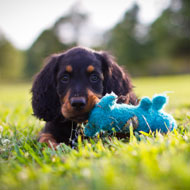Dogs create a ‘mental representation’ of objects they smell

“Although they had obviously noticed the toy, they continued to search via smell, probably for the toy that had been used to lay the scent trail.”
A new study suggests that dogs create a ‘mental representation’ of objects they perceive through smell. What’s more, they show signs of surprise if they find an unexpected object at the end of the scent trail.
Whilst dogs are renowned for their excellent sense of smell, little research has been done on how they perceive objects through scent.
A study published in the Journal of Comparative Psychology tested 48 dogs, 25 of which were police or search and rescue dogs. The remainder were family dogs with no specialised training.
During a pre-test, scientists identified two toys that each dog liked to retrieve. Each dog then underwent four trials in which they followed a scent trail drawn with one of the two toys. At the end of the trail, the dogs either found the toy with which the track had been laid, or the other toy.
Study director Dr Juliane Bräuer said the dogs showed ‘hesitation’ during the first round of the ‘surprise’ condition, where they found a different toy at the end of the trail.
“Although they had obviously noticed the toy, they continued to search via smell, probably for the toy that had been used to lay the scent trail,” she explained.
However, this effect disappeared in the subsequent test rounds, which scientists say could be because they dogs were rewarded with games, regardless of which toy they found, or because the room still smelled of the toys from previous tests, despite being cleaned.
As expected, the police and rescue dogs retrieved the toys faster than the family dogs, but interestingly this effect also disappeared within four rounds.
Researchers say further studies will help to clarify the connection between smell perception, search behaviour and cognition.



 The RCVS has announced a new version of its 1CPD mobile app, with enhanced features for veterinary surgeons and veterinary nurses to record their continuing professional development.
The RCVS has announced a new version of its 1CPD mobile app, with enhanced features for veterinary surgeons and veterinary nurses to record their continuing professional development.